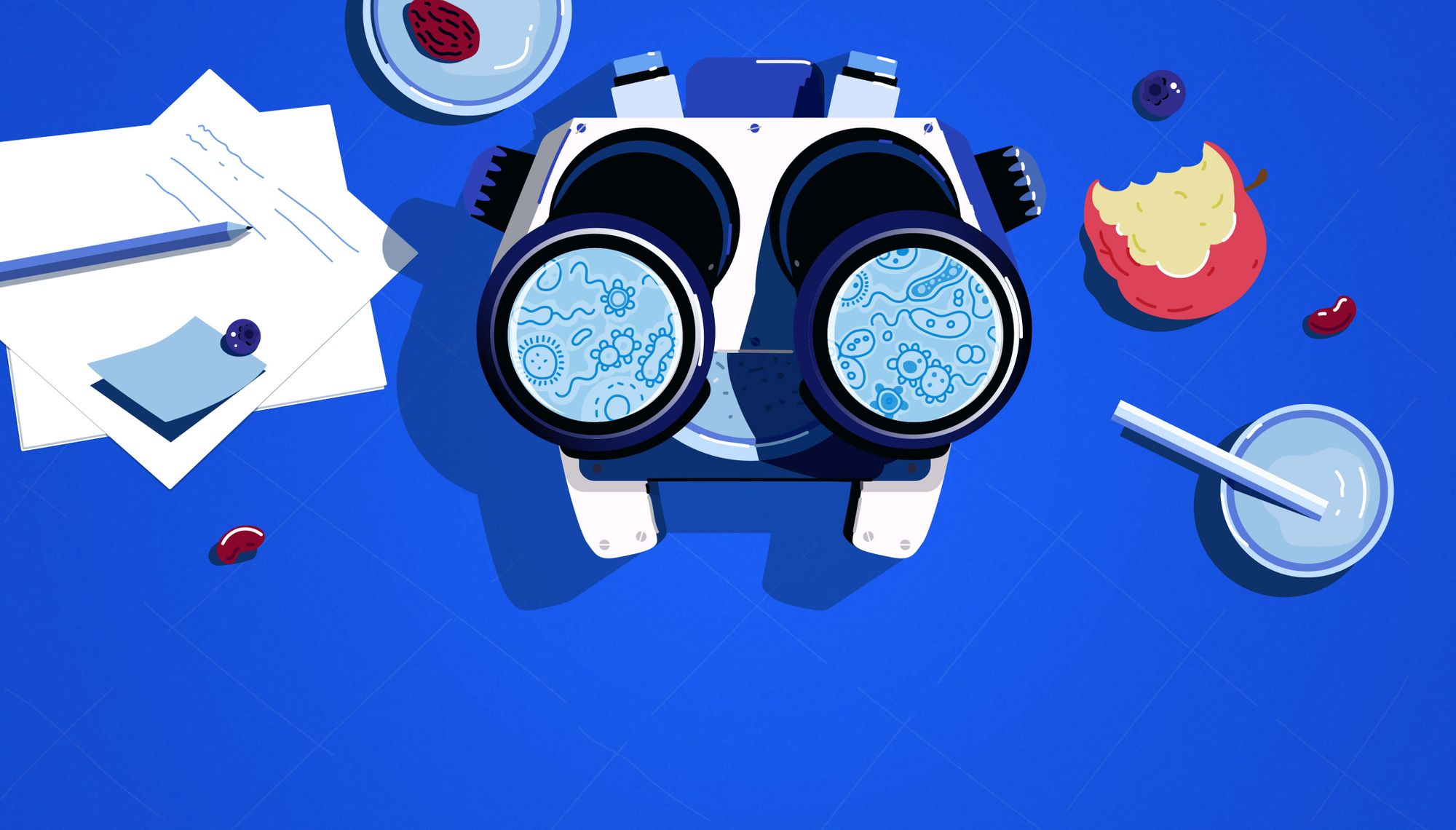Everyone talks about the importance of gut health. But today in our blog we want to talk about the mechanisms and science beyond of the microbiome.
What actually is the microbiome?
Scientists consider the gut microbiota or microbiome to be a new organ in our body. It is a vast ecosystem of organisms such as bacteria, fungi, viruses and protozoans which live in your colon. Bacteria are by far the most numerous members of the human microbiome.
The idea that our body is a home to a huge number of organisms is a little bit scary, but still, there is nothing we can do about it. Moreover, it’s a vital part of our health: we cannot live well without these small fellows.
In the digestive system, bacteria help us break down foods like plant fibre that we are not so good at handling ourselves. They probably also supply us with some necessary vitamins B and Vitamin K. Experiments done on guinea pigs have shown that animals raised in a sterile environment without any bacteria become malnourished and die young.
Although bacteria are tiny creatures, the human microbiome is actually the heaviest organ in our body. It weighs about three pounds (it’s even heavier than a human brain) and there are as many organisms as cells in an average human body.
How does your microbiome work?
Our digestive system breaks down food into small parts that then become available for absorption. Most of the processes of breaking down and absorbing carbohydrates, proteins, and fats and reducing them to relatively simple organic compounds occur in the small intestine. The absorption of vital minerals and vitamins also happens there.
The colon receives indigestible carbohydrates. Without the activity of the colonic microbiota, these substances would generally be eliminated via stool without further absorption because our large intestine has a limited digestive capability.
Butyrate arises from bacterial fermentation of dietary fibre. It is the primary energy source for colonic cells. Furthermore, butyrate has been shown to be a critical mediator of the colonic inflammatory response.
Another reason to look after your microbiome is that good bacteria protect the mucus in your gut from harmful bacteria. Mucus is a viscid slippery secretion that forms an essential layer in the colon and in the small intestine. It helps reduce intestinal inflammation by decreasing bacterial interaction with intestinal epithelial cells.
On the surface layer of mucin, friendly bacteria compete with harmful bacteria for resources. Who wins depends on what you eat. If you eat fruits, vegetables and whole grains, you will feed your army of nice-guy bacteria that helps you stay healthy.
Different species of bacteria are involved in food fermentation as they break complex carbohydrates. And it’s not easy for such tiny creatures! Some species are only involved in the beginning of the process. They start tearing a carbohydrate but haven’t got enough power to finish it. Other species continue their work and still others finish up.
How to take care of your bacteria
There are some simple rules that help improve your gut health.
Fibre
Be sure that you take enough fibre per day. As we said, complex carbohydrates are nutrition for your good bacteria in a large intestine. And fibre is the best source of these types of carbs.
The Scientific Advisory Committee on Nutrition UK recommends increasing your fibre intake to 30g per day. But the reality is most people only eat an average of about 18g per day, just 60% of daily value.
Here are some tips that help you to increase the amount of fibre in your diet.
- Switch white bread, pasta and rice to brown and whole-grain alternatives;
- Try to include wholegrain breakfast cereals, muesli, oats, barley or rye in your breakfasts;
- Eat nuts, seeds or fruits such as berries, pears, melon and oranges as healthy snacks;
- Add peas, beans and vegetables such as broccoli, carrots or sweet corn to your meals;
- Cook potatoes with skin.
Food diversity
Different bacteria prefer different types of food. Some of them like sweet fruits, some prefer starchy or green leaves vegetables, some go for whole grains. Therefore, the more diverse the diet, the more diverse the microbiome and the more adaptable it will be to future disturbances. Also, different foods and food groups are good sources for various macro- and micronutrients, so a diverse diet is the best way to ensures nutrient adequacy.
The best approach to diversifying your food is to cook different dishes, eat a variety of fruits and vegetables, try new foods when it is possible. For our Microbiome test users, we’ve made the list of top 10 products which help them diversify your diet and increase your number of good bacteria. It’s updated every week, so users won’t get bored.
Sport
Regular exercises can improve your gut health too. In one of the latest studies, researchers examined the faecal samples of 18 lean and 14 obese sedentary adults after six weeks of exercising. Participants performed supervised cardiovascular exercise for 30-60 minutes three times a week.
The World Health Organisation recommends at least 150 minutes of moderate-intensity physical activity throughout the week, or at least 75 minutes of vigorous-intensity physical activity throughout the week, or an equivalent combination of moderate- and vigorous-intensity activity.
Antibiotics
Antibiotics that used as a treatment for bacterial infection not only kill “bad” pathogenic bacteria but the good ones too. Antibiotics heavily disrupt the ecology of microorganism in your gut. The dysbiotic microbiome may not perform vital functions such as nutrient supply, vitamin production, and protection from pathogens. And this condition has been associated with a large number of health problems.
To avoid excessive antibiotic consumption or reduce their harmful effects, follow these rules:
- Do not buy antibiotics without a prescription. They must be prescribed by a doctor and only for bacterial infections or for other diseases caused by bacteria.
- Antibiotics do not kill viruses, so don’t try to treat a flu with antibiotics.
- The more antibiotics used to treat trivial conditions, the more likely they are to become ineffective for treating more serious conditions.
- If you need to take antibiotics, ask your GP about probiotics. Without probiotics, antibiotics can sometimes wipe out the protective gut bacteria, resulting in diarrhoea.
Antibacterial agents
Triclosan is one of the most popular antibacterial chemicals. A lot of products we use daily contain triclosan: soaps, toothpaste, body wash, kitchenware. And therein lies the problem. Studies suggest that this compound has a negative impact on our microbiome and gut health.
Researchers tested triclosan in normal, healthy mice and found that the chemical caused low-grade inflammation. They suggest that it might be disrupting the community of microbes in our guts vital for maintaining good health.
Of course, this study was only demonstrated on a small mouse cohort and we need a well-designed study in human. But it’s better to avoid antibacterial washes as much as possible.
☝️ Remember
1. The microbiome is an organ which consists of bacteria and other microorganisms that helps us digest food.
2. Good bacteria produce butyrate – one of the most vital short-chain fatty acids for our gut health.
3. Be sure that you eat 30g fibre per day.
4. Regular exercises can improve your gut health.
5. Avoid excessive antibiotic consumption.
6. Avoid antibacterial washes as much as possible.
7. If you want to know more about your gut bacteria, order our Microbiome test.
- Role of the gut microbiota in nutrition and health. The BMJ.
- A healthy gastrointestinal microbiome is dependent on dietary diversity. Molecular Metabolism, Elsevier.
- Effects of Gut Microbes on Nutrient Absorption and Energy Regulation. PubMed.
- Human digestive system. Britannica.
- Exercise Alters Gut Microbiota Composition and Function in Lean and Obese Humans. PubMed.
- Triclosan, a common antimicrobial in toothpaste and other products, linked to inflammation and cancer in the gut. The Conversation.
- The effects of antibiotics on the microbiome throughout development and alternative approaches for therapeutic modulation. PubMed.
- Probiotics. NHS.

















